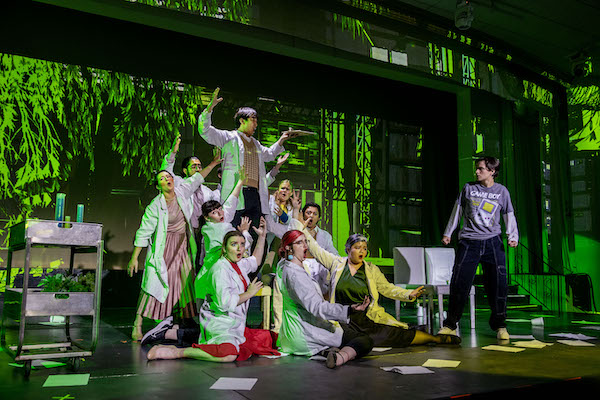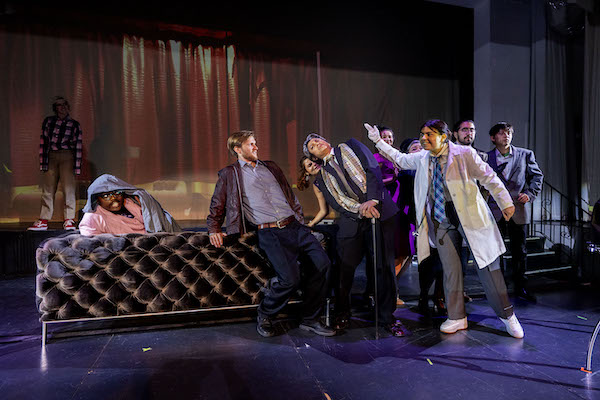Miami Beach Music Festival serves up an innovative operatic double bill of Ravel and Puccini

Ravel’s L’enfant et les sortilèges was performed by the Miami Beach Classical Music Festival Saturday night. Photo: Dennis Oda / MBCMF
Modern technology and opera melded seamlessly when the Miami Beach Classical Music Festival presented an immersive production of Ravel’s L’enfant et les sortileges (as part of a double bill with Puccini’s Gianni Schicchi) Saturday night in the ballroom of Temple Emanu-El in Miami Beach. Festival director Michael Rossi’s mappings engulfed the staging’s backdrop and the walls around the space for a surround immersive experience of cinematic proportions.
Ravel’s 1925 opera was the perfect opus for this innovative approach. With a libretto by Colette, the tale of an unruly child who disobeys his mother and encounters a series of animals and fairy tale characters who teach him the value of compassion finds Ravel at his most inventive. While the composer’s individual voice is very much present, American jazz and popular dance music (which had taken Paris by storm), Gallic chanson and even allusions to Renaissance chant wind through the 45- minute score.
Director Marc Callahan has set this production in an experimental behavioral modification institute where the child is taken and put through several stages of therapy. A team of white clad, coffee drinking doctors and nurses play the animals and characters, culminating in the child calling for his mother who arrives to be shown positive scores on the reformed juvenile’s test record. Rossi’s projections of trees, birds, the child’s dreams, and the universe surround the onstage medical drama. The concept proved greatly entertaining and blended astonishingly well with Ravel’s innovative stylistic mix.
With the large orchestral forces placed on the left side of the ballroom, conductor Ben Makino managed the balance issues adroitly, rarely overpowering the large cast of singers. He drew precise and often sensuous sonorities from the young musicians, evidencing a real affinity for Ravel’s deft interplay of timbres and multi colored instrumental effects.
Sarah Austin’s rich mezzo projected the child’s unruly willfulness and sense of wonder. Lily Bogas’s powerful top range fully conveyed the thoroughly contemporary mother’s anguish at her child’s disobedience.
In the uniformly strong cast of clinicians, José Fernandez’s bright baritonal suavity and the lightness of Meredith Harron’s soprano were standouts, bringing pizzazz to Ravel’s suggestions of popular song and dance.
Brandon Flores’ booming resonance embodied L’Horologe. In a double role as Fire and the Nightingale, Elena Klein evidenced a distinctively French coloratura brightness of timbre reminiscent of such past stars as Lily Pons, Mado Robin and Mady Mesplé. Klein’s trills and high leaps were fearless and rendered with spot-on accuracy.
Catherine Howland sang the Princess’s lyrical lament winningly with Makino perfectly dovetailing the vital accompanying wind lines. Harron and Olivia Grocott’s cat duet perfectly crystallized Ravel’s modernist harmonics.
Tinghao Zhang’s incisive textual delivery and rhythmic snap embodied Rainette’s brief but potent solos. The spare emotive lines of the final chorus were beautifully sung and coordinated. The entire presentation did justice to the fantasy, humanism and populist elements of Ravel’s singular creation.

Puccini’s Gianni Schicchi was performed on the second half of Saturday’s double bill. Photo: Dennis Oda / MBCMF
Gianni Schicchi is a delightful comedy about the greedy and conniving Donati family who hire the clever Schicchi to impersonate the deceased Buoso Donati to dictate a new will since the wealthy patriarch left most of his wealth and property to the church. Schicchi cagily gives the best holdings to himself, enraging the Donatis but allowing his lovestruck daughter Lauretta to marry her lover Rinuccio Donati. Puccini’s rapid-fire patter, in the vein of Verdi’s Falstaff, pauses for typical song-filled arias, most notably “O mio babbino caro.”
Dave Toulson’s modern dress production was, at times too broadly slapstick. Schicchi swinging his hips and a notary with a laptop just seem too far removed from the sophisticated comic milieu of Giovacchino Forzano’s text. Still, Toulson’s fast-paced version kept the action fluid and, excesses aside, brought out the wit of this Puccini’s only comedy.
Rodney Sharp’s smooth, deep baritone and rotund declamation proclaimed Schicchi as a protagonist who knew how to take charge of a situation. His impersonation of the dying Donati was hilariously effective. Yu Shin Chow sang Lauretta’s million-dollar aria with unforced lyricism in an appealing light soprano. Jonas Rimkunas (who did several roles in the Ravel opera) vaulted Rinuccio’s ode to the city of Florence in a well-placed, dulcet tenor. Rimkunas’ voice was perfectly matched with Chow’s in the lovers final duet.
The warmth of Danlei Zhao’s mezzo was icing on the cake of her canny portrayal of the conniving, mean spirited Zita. As Simone, the former mayor and Donati elder, Jose Mendoza’s meaty baritone made his every utterance count beyond its brevity. Makino’s pacing kept the aura bubbly with fine detailing of Puccini’s instrumental felicities.
Julia La Vault’s lighting set the mood and aura of both operas’ dramaturgy and Paulina Lozano’s costumes were an eye catching mix of shades and modern designs. The twin offering proved one of the festival’s most adventurous and rewarding presentations.
The Miami Beach Classical Music Festival repeats the double bill 2 p.m. Sunday at the Temple Emanu-El ballroom in Miami Beach. miamimusicfestival.com
Posted in Performances
Leave a Comment
Sun Jul 16, 2023
at 12:57 pm
No Comments